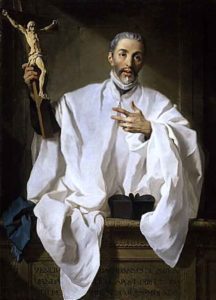Podcast: Play in new window | Download (Duration: 31:57 — 22.0MB) | Embed
Subscribe: Apple Podcasts | Spotify | Amazon Music | Android | Pandora | iHeartRadio | JioSaavn | Podchaser | Gaana | Podcast Index | Email | TuneIn | Deezer | Anghami | RSS | More

St. John of Avila, Part 1 – The Doctors of the Church: The Charism of Wisdom with Dr. Matthew Bunson
- Born: January 6, 1499, Almodóvar del Campo, Spain
- Died: May 10, 1569, Montilla, Spain
Dr. Matthew Bunson and Kris McGregor discuss the life and impact of St. John of Avila, a doctor of the Church. They highlight his influence on spiritual figures like St. Ignatius of Loyola, St. Teresa of Avila, St. John of the Cross, Peter of Alcantara, John of God, and Francis Borgia during the Catholic Reformation in 16th-century Spain.
Born into a deeply faithful family, John displayed intellectual brilliance and a love for the faith, particularly the Eucharist, from an early age. Initially studying law, John felt called to priesthood and dedicated himself to prayer and discernment. Encouraged by a Franciscan friar, he embraced his vocation, eventually becoming a renowned preacher and spiritual guide. His homilies, grounded in scripture and grace, attracted large crowds and led to a revitalization of the faith in Andalusia.
Despite facing opposition and a year-long investigation by the Inquisition, John remained steadfast in his commitment to reform, care for the poor, and authentic Gospel living. He established schools and influenced the formation of various religious orders, leaving a lasting legacy in the Church.
Discerning Hearts Reflection Questions
- St. John of Avila’s Influence: How did St. John of Avila influence key figures like Ignatius Loyola, Teresa of Avila, John of the Cross, and Francis Borja during the Catholic Reformation in Spain?
- Obedience and Service: Reflect on St. John’s obedience to authority, even when it meant redirecting his plans to serve the Church in Andalusia. How can we emulate this obedience in our own lives?
- Courage in Preaching: Despite facing opposition, St. John preached fearlessly against the wealth of the clergy and advocated for care for the poor. How can we summon similar courage in living out the Gospel in today’s society?
- Spiritual Formation and Holiness: Discuss how St. John’s spiritual guidance and example contributed to the formation and holiness of individuals like Francis Borja and Teresa of Avila. How can spiritual mentors shape our own journey of faith?

From Vatican.va, an excerpt from the teachings of Pope Benedict XVI
From the General Audience on St. John of Avila
“Thanks to his insight into the times and his excellent academic training, John of Avila was an outstanding theologian and a true humanist. He proposed the establishment of an international court of arbitration to avoid wars and he invented and patented a number of engineering devices. Leading a life of great poverty, he devoted himself above all to encouraging the Christian life of those who readily listened to his preaching and followed him everywhere. He was especially concerned for the education and instruction of boys and young men, especially those studying for the priesthood. He founded several minor and major colleges, which after the Council of Trent would become seminaries along the lines laid down by that Council. He also founded the University of Baeza, which was known for centuries for its work of training clerics and laity.
John of Avila was a contemporary, friend and counsellor of great saints, and one of the most celebrated and widely esteemed spiritual masters of his time. Saint Ignatius Loyola, who held him in high regard, was eager for him to enter the nascent “Company” which was to become the Society of Jesus. Although he himself did not enter, the Master directed some thirty of his best students to the Society. Juan Ciudad, later Saint John of God, the founder of the Order of Hospitallers, was converted by listening to the saintly Master and thereafter relied on him as his spiritual director. The grandee Saint Francis Borgia, later the General of the Society of Jesus, was another important convert thanks to the help of Father Avila. Saint Thomas of Villanova, Archbishop of Valencia, disseminated Father Avila’s catechetical method in his diocese and throughout the south of Spain. Among Father Avila’s friends were Saint Peter of Alcántara, Provincial of the Franciscans and reformer of the Order, and Saint John de Ribera, Bishop of Badajoz, who asked him to provide preachers to renew his diocese and later, as Archbishop of Valencia, kept a manuscript in his library containing 82 of John’s sermons. Teresa of Jesus, now a Doctor of the Church, underwent great trials before she was able to send him the manuscript of her Autobiography. Saint John of the Cross, also a Doctor of the Church, was in touch with his disciples in Baeza who assisted in the Carmelite reform. Blessed Bartholomew of the Martyrs was acquainted with his life and holiness through common friends, and many others acknowledged the moral and spiritual authority of the Master.”
For more visit \Vatican.va
For more from Dr. Matthew Bunson, check out his Discerning Hearts page.
Dr. Matthew E. Bunson is a Register senior editor and a senior contributor to EWTN News. For the past 20 years, he has been active in the area of Catholic social communications and education, including writing, editing, and teaching on a variety of topics related to Church history, the papacy, the saints and Catholic culture. He is faculty chair at Catholic Distance University, a senior fellow of the St. Paul Center for Biblical Theology, and the author or co-author of over 50 books including The Encyclopedia of Catholic History, The Pope Encyclopedia, We Have a Pope! Benedict XVI, The Saints Encyclopedia and best-selling biographies of St. Damien of Molokai and St. Kateri Tekakwitha.


